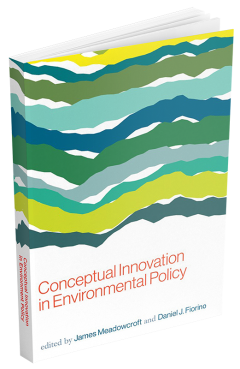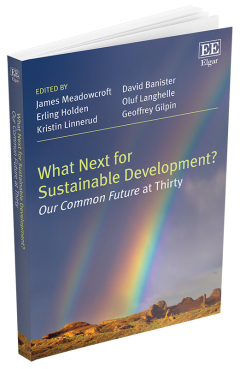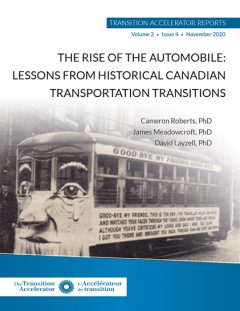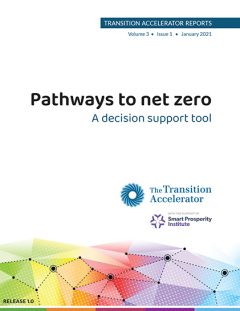
James Meadowcroft
Environmental politics and policy; Energy and climate policy; Energy transitions and decarbonization pathways; Governance for sustainable development
| Degrees: | BA (McGill) DPhil (Oxford) |
| Phone: | 613-520-2600 x 2214 |
| Email: | james.meadowcroft@carleton.ca |
| Office: | 5139 River Building |
Brief Biography
James Meadowcroft is a Professor in both the Department of Political Science and the School of Public Policy and Administration. He recently completed a 14-year term as a Tier 1 Canada Research Chair in Governance for Sustainable Development. Meadowcroft has written widely on environmental politics and policy, democratic participation and deliberative democracy, national sustainable development strategies, and socio-technical transitions. Recent work focuses on energy and the transition to a low carbon society and includes publications on carbon capture and storage (CCS), smart grids, the development of Ontario’s electricity system, the politics of socio-technical transitions, and negative carbon emissions. Meadowcroft’s research has been funded by the UK ERSC, SSHRC, NSERC, the Ivey Foundation, McConnell Foundation, and Carbon Management Canada. He has supervised PhD students working on a variety of environment and energy-related topics including North American air pollution, the politics of biofuels, decarbonization pathways and energy futures.
Meadowcroft is currently Research Director, alongside David Layzell and Normand Mousseau, of the Transition Accelerator, which utilizes a world-leading four-step methodology to engage diverse societal stakeholders to co-create visions of what a socially and economically desirable net-zero future will look like and build out transition pathways that will enable Canada to get there. As a result of his work with the Accelerator, Meadowcroft regularly presents to senior government officials, industry leaders, and civil society groups to build momentum to make the changes needed to address climate change. Meadowcroft also leads Efficiency Canada — an independent, pan-Canadian think tank that conducts rigorous policy analysis, communicates compelling narratives, and convene and mobilize Canada’s dynamic energy efficiency sector to make our country a global leader in energy efficiency policy, technology, and jobs.
Meadowcroft has served as co-editor of the International Political Science Review (1999-2007) and Associate Editor of the Journal of Political Ideologies (2006-). He holds an honorary doctorate from the University of Tampere in Finland.
Recent edited collections

Multilevel Environmental Governance:
Managing Water and Climate Change in Europe and North America
The literature on Multi-level governance (MLG), an approach that explicitly looks at the system of the many interacting authority structures at work in the global political economy, has grown significantly over the last decade. The authors in this volume examine how multilevel governance (MLG) systems address climate change and water policy.
Conceptual Innovation in
Environmental Policy
Concepts are thought categories through which we apprehend the world; they enable, but also constrain, reasoning and debate and serve as building blocks for more elaborate arguments. This book traces the links between conceptual innovation in the environmental sphere and the evolution of environmental policy and discourse. It offers both a broad framework for examining the emergence, evolution, and effects of policy concepts and a detailed analysis of eleven influential environmental concepts.
ISBN: 9780262534086


What Next for Sustainable Development?
Our Common Future at Thirty
This book examines the international experience with sustainable development since the concept was brought to worldwide attention in Our Common Future, the 1987 report of the World Commission on Environment and Development. Scholars from a variety of disciplinary backgrounds engage with three critical themes: negotiating environmental limits; equity, environment and development; and transitions and transformations. In light of the 2030 Sustainable Development Goals recently adopted by the United Nations General Assembly, they ask what lies ahead for sustainable development.
ISBN: 978 1 78897 519 3
Interviews and Lectures
Energi Media
Markham interviews Dr. James Meadowcroft, research director of The Transition Accelerator, about his new study, Pathways to Net Zero: A Decision Support Tool.
Jean Monnet Network Carleton CANEUNET
“Where Next for Canada’s Low Carbon Transition?”
James Meadowcroft, Carleton University
On February 9th, 2018, the Centre for European Studies hosted a policy workshop, “Clean Energy & Climate Policy in Canada and the EU: an Exchange of Experiences, Views, and Visions for the Future,” at Carleton University.
Smart Prosperity Institute
James Meadowcroft speaks of the need to frame the discussion as a socio-technical transition towards a low carbon emission energy sector. He describes how our economic and political institutions are currently in a technological lock-in (path dependence) on current fossil fuel.
Selected Publications
- Meadowcroft, J., Banister, D., & Holden, E., Langhelle, O., Linnerud, K., & Gilpin, G. (Eds.). (2019). What next for sustainable development? Our common future at thirty. Edward Elgar Publishing.
- Meadowcroft, J., & Steurer, R. (2018). Assessment practices in the policy and politics cycles: a contribution to reflexive governance for sustainable development? Journal of Environmental Policy & Planning, 20(6), 734-751.
- Meadowcroft, J., Stephens, J. C., Wilson, E. J., & Rowlands, I. H. (2018). Social dimensions of smart grid: Regional analysis in Canada and the United States. Introduction to special issue of Renewable and Sustainable Energy Reviews. Renewable and Sustainable Energy Reviews, 82, 1909-1912.
- Meadowcroft, J., & Fiorino, D. J. (Eds.). (2017). Conceptual innovation in environmental policy. MIT press.
- Meadowcroft, J. (2016). Let’s Get This Transition Moving! Canadian Public Policy, 42(s1), 10-17.
- Meadowcroft, J. (2013). Reaching the limits? Developed country engagement with sustainable development in a challenging conjuncture. Environment and Planning C: Government and Policy, 31(6), 988-1002.
- Meadowcroft, J. (2013). Exploring negative territory carbon dioxide removal and climate policy initiatives. Climatic Change, 118(1), 137-149.
- Meadowcroft, J., Langhelle, O., & Rudd, A. (Eds.). (2012). Governance, Democracy and Sustainable Development: Moving Beyond the Impasse. Edward Elgar Publishing.
- Meadowcroft, J. (2012). Greening the State? In Steinberg P. & VanDeveer S. (Eds.), Comparative Environmental Politics: Theory, Practice, and Prospects (pp. 63-88). MIT Press.
- Bäckstrand, K., Meadowcroft, J., & Oppenheimer, M. (2011). The politics and policy of carbon capture and storage: Framing an emergent technology. Global Environmental Change, 21(2), 275-281.
- Meadowcroft, J. (2011). Engaging with the politics of sustainability transitions. Environmental Innovation and Societal Transitions, 1(1), 70-75.
- Meadowcroft, J. (2009). What about the politics? Sustainable development, transition management, and long-term energy transitions. Policy Sciences, 4(42), 323-340.
- Meadowcroft, J. R., & Langhelle, O. (Eds.). (2009). Caching the carbon: The politics and policy of carbon capture and storage. Edward Elgar Publishing.
- Meadowcroft, J. (2007). Who is in charge here? Governance for sustainable development in a complex world. Journal of Environmental Policy & Planning, 9(3-4), 299-314.
The Rise of the Automobile: This paper examines the experience of an earlier transition in land transport in the early twentieth century that saw the rapid adoption of the automobile, and asks what can we learn from this history to inform future sustainability transitions?
Selected reviews of recent co-edited publications
- Lennon, Breffní. “What next for Sustainable Development? Our Common Future at Thirty.” Eurasian Geography and Economics, vol. 61, no. 3, May 2020, pp. 338–340, doi:10.1080/15387216.2019.1689836.
- Simonis, Udo E. “Caching the Carbon. The Politics and Policy of Carbon Capture and Storage.” Environmental Politics, vol. 20, no. 4, Routledge, 2011, pp. 602–04, doi:10.1080/09644016.2011.589591.
- Paehlke, Robert. “Innovation, science, environment: charting sustainable development in Canada,
1987–2007.” Environmental Politics, vol. 20, no. 1, 2011, pp. 146-148.
Features on University Website
2020
- January 13, 2020
How to Fix the Climate: Accelerate Social Change (Another Take) - February 20, 2020
Carleton’s Author Meets Readers Panel to Discuss the Evolution of Modern Environmental Policy - May 20, 2020
Carleton’s James Meadowcroft is on National Task Force on Economic Recovery Post-COVID - May 21, 2020
Professor James Meadowcroft on National Recovery Taskforce (News) - September 17, 2020
Carleton’s James Meadowcroft Contributes to Final Report of Task Force for a Resilient Recovery
2019
- December 17, 2019
Carleton Ranks 2nd in Canada and 35th in the World for Campus Sustainability - April 29, 2019
Energy Efficiency Policy: Teaching Effective Policy - June 19, 2019
Global Gathering: Carleton Hosts International Sustainability Conference - June 3, 2019
Carleton-Based Energy Efficiency Think Tank Launches National Campaign to Showcase Workers Behind the Boom in Green Jobs
2018
- November 2, 2018
Carleton Launches Efficiency Canada - November 7, 2018
Carleton Takes Lead in Energy Efficiency (News)
2017
- May 26, 2017
Carleton Contributes to Major Report on Using Vast Low Carbon Energy Resources for Major New Economic Engine - May 29, 2017
Robo-wars and Driverless Cars: New Course Covers Technology, Nature, and Power (News) - February 3, 2017
Climate Policy Champions (FPA Voices)
2014
- October 21, 2014
Nature Draws a Hard Line: Govts vs. Climate Change (News) - April 24, 2014
Multilevel Environmental Governance (News)
2010
Links to Media Interviews/Videos/Podcasts
Media Interviews
- January 28, 2021
Why experts argue governments must take risks — besides pipelines — to restart economic growth (CBC News) - November 16, 2020
La région d’Edmonton veut mener l’exploitation de l’hydrogène au Canada (Ici Radio-Canada) - June 24, 2020
Timing is everything: how Canada got into a pandemic economy — and how it might get out (CBC News) - July 8, 2019
Why planting one trillion trees won’t solve climate change (CTV News) - November 21, 2015
Climate Change Undermines Security (Ottawa Citizen) - March 26, 2015
Here’s How Canada Could Have 100% Renewable Electricity by 2035 (The Narwhal) - March 7, 2015
Castles in the air: Canada’s unexploitable hydrocarbon ‘resources’ (The Hill Times) - May 2, 2012
Alberta steps up battle to shed ‘dirty oil’ image (The Globe & Mail) - October 7, 2008
Canada Productive But Should Do More, Experts Say (Montreal Gazette)
Videos
- January 26, 2021
Interview on Transition Accelerator Report “Pathways to Net Zero” (Energi Media) - September 24, 2020
Pathways to Net Zero in Canada (Governing Energy Transitions Seminar Series, University of Stavanger) - February 9, 2018
Where Next for Canada’s Low Carbon Transition? (Centre for European Studies Policy Workshop, Carleton University) - November 27, 2015
Canada’s Transition to a Low Carbon Emission Society (Centre for European Studies, Carleton University) - November 2, 2015
Taskforce on Conceptual Foundations of Earth System Governance (Earth System Governance TV) - May 22, 2014
Let’s Get This Transition Moving! (Big Ideas for Sustainable Prosperity Conference, Ottawa) - May 16, 2012
PV Policy Regulation and Law (Canadian Photovoltaics Graduate School workshop, University of Ottawa) - March 9, 2012
Pushing the Boundaries: Governance for Sustainable Development and a Politics of Limits (Sustainable Consumption Research and Action Initiative (SCORAI) Workshop in Vancouver, British Columbia)
Podcasts
- September 9, 2020
Episode 2: Introduction to EcoPolitics (The EcoPolitics Podcast) - January 5, 2017
BZE speaks to Prof James Meadowcroft (Beyond Zero – Science and Solutions)
Links to Transition Accelerator and Efficiency Canada
Transition Accelerator
Profile for Research Directors – James Meadowcroft
- January 25, 2021
News Release: New Report Recommends Paradigm Shift in Approach to Tackling Climate Change - January 2021
Report – Pathways to Net Zero: A Decision Support Tool
Meadowcroft, J. and contributors. 2021. Pathways to net-zero: A decision support tool. Transition Accelerator Reports Vol. 3, Iss. 1. Pg 1-108
ISSN 2562-6264. - November 9, 2020
News Release: New Initiative to Support a Robust National ZEV Supply Chain - November 2020
Report – The Rise Of The Automobile: Lessons From Historical Canadian Transportation Transitions
Roberts, C, Meadowcroft, J, Layzell, DB. 2020. The Rise of the Automobile: Lessons from Historical Canadian Transportation Transitions. Transition Accelerator Reports Vol. 2, Iss. 4, Pg. 1-35.
ISSN 2562-6264. - August 2019
Report – The Transition Accelerator: Building Pathways to a Sustainable Future
Meadowcroft, J, Layzell, DB, Mousseau, N. 2019. The Transition Accelerator: Building Pathways to a Sustainable Future. Transition Accelerator Reports Vol. 1, Iss. 1, Pg. 1-65.
ISSN 2562-6264. - September 2017
Report: Re-Energizing Canada: Pathways to a Low-Carbon Future - November 2016
Report: Let’s Get This Transition Moving!
Efficiency Canada
• Efficiency Canada Governing Council (includes James’ Bio)

